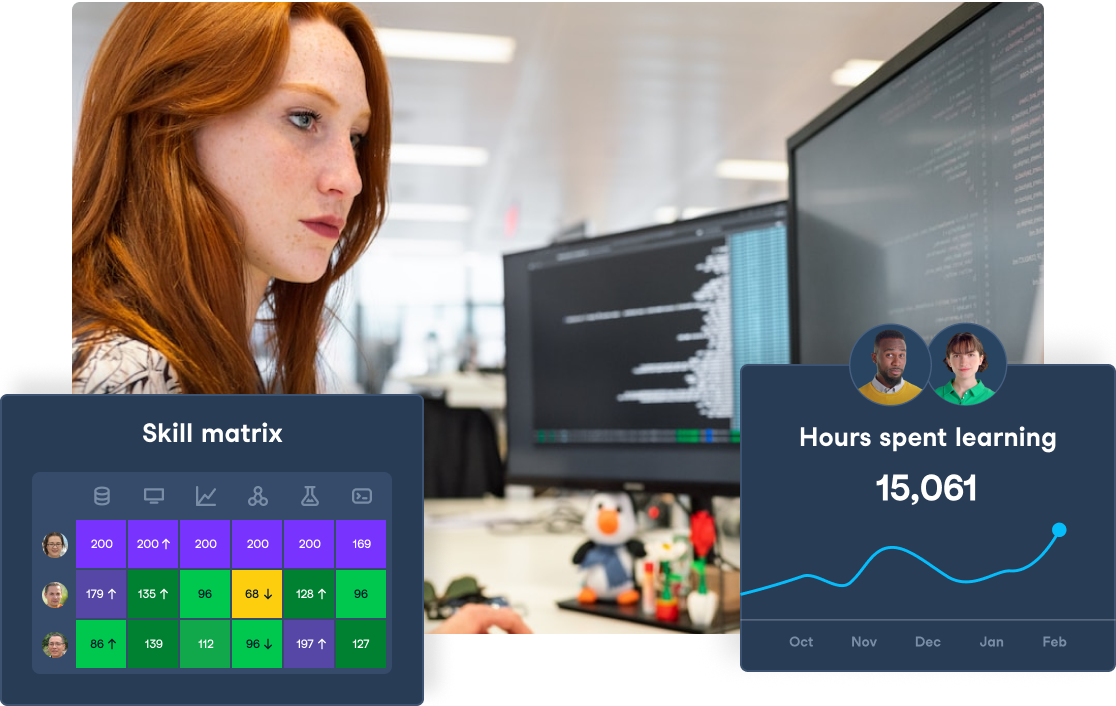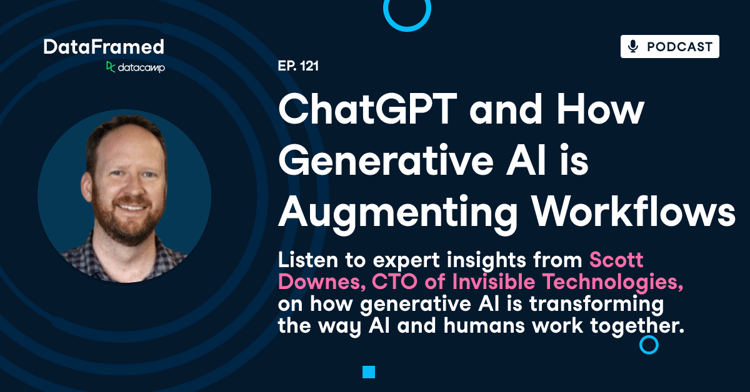Track
Disclaimer: While ChatGPT can be a valuable assistant for legal professionals, it should not be relied upon for legal advice or final work product. The information provided by AI models may be incomplete, outdated, or incorrect. Always verify any output with authoritative legal sources and apply professional judgment.
Remember when legal research meant spending hours in law libraries, or when drafting routine documents consumed entire afternoons? For many lawyers, these time-intensive tasks are now being transformed by generative AI tools like ChatGPT. Whether you're a seasoned attorney or just starting your legal career, understanding how to work effectively with AI can make a meaningful difference in your practice.
Personally, I think of ChatGPT as a particularly eager junior associate – one who can help with initial research, draft preliminary documents, and suggest different approaches to problems. But like any junior associate, its work needs careful review and guidance from experienced professionals. When used thoughtfully, ChatGPT's natural language processing capabilities can help with everything from summarizing case law to explaining complex legal concepts in plain language.
In this guide, we'll explore practical ways to integrate ChatGPT into your legal practice, share effective prompting strategies, and discuss important ethical considerations. You'll learn how to use this technology while maintaining the high standards your clients expect. If you are looking for a place to start learning about AI technology, DataCamp offers several options: Understanding Artificial Intelligence, ChatGPT Prompt Engineering for Developers, and our ChatGPT Fundamentals skill track.
Check out our webinar on What ChatGPT and Generative AI Mean for Data Privacy to learn more.
How ChatGPT Can Transform Your Legal Practice
Let's explore how ChatGPT can enhance your practice in meaningful ways – not by replacing your expertise, but by giving you more time to apply it.
If you are looking to have a conversation with leaders in this space, fill out this form to unlock the power of DataCamp enterprise solutions. We have extensive experience upskilling the workforce in a variety of both large and small companies with our library of tracks, which cover everything from programming to AI topics. We recognize that many industries (such as legal) are transforming rapidly in the age of AI. Connect today because we know how to help businesses stay healthy using the latest tools like ChatGPT.
Elevate Your Organization's AI Skills
Transform your business by empowering your teams with advanced AI skills through DataCamp for Business. Achieve better insights and efficiency.

Streamlining document work without sacrificing quality
Picture spending less time on initial drafts and more time on strategic thinking. Legal professionals are using ChatGPT to create first drafts of contracts, pleadings, and memos. The key is providing clear prompts and treating the output as a starting point rather than a finished product. For example, you might ask ChatGPT to draft a basic NDA, then apply your expertise to customize it for your client's specific needs.
Making legal concepts clear and accessible
One of the most valuable applications of ChatGPT is its ability to translate complex legal concepts into plain language. When clients better understand their cases, they make more informed decisions and feel more confident in your guidance. You can use ChatGPT to generate clear explanations of legal processes, draft client-friendly summaries of case developments, or create FAQs for common legal scenarios.
Research assistant at your fingertips
While ChatGPT shouldn't be your primary research tool, it is good for providing quick overviews and steering your research. Think of it as a brainstorming partner who can help you spot relevant angles you might want to explore further. It's particularly helpful for getting up to speed on unfamiliar areas of law or identifying potential counter-arguments.
Elevating your legal marketing strategy
Many law firms are discovering ChatGPT's value in creating engaging content for their marketing efforts. From crafting informative blog posts to developing social media content, ChatGPT can help you maintain a consistent online presence without taking time away from your legal work. Read our Beginner's Guide to ChatGPT Prompts for Marketing for more marketing-specific ideas.
Real-World Applications: ChatGPT in Legal Practice
Let's move beyond theory and look at specific ways law firms are using ChatGPT to enhance their practice. We'll explore two key areas where ChatGPT is making a notable impact: document creation and marketing efforts.
ChatGPT for legal documents
Let's start with the bread and butter of legal practice: document creation. Here's how law firms are using ChatGPT to speed up their documentation process:
Initial draft generation
Instead of starting with a blank page, many lawyers now begin with a ChatGPT-generated draft. For example:
Draft a cease and desist letter regarding trademark infringement in the software industry. Include standard elements and placeholder details.Document analysis and summarization
When faced with lengthy contracts or depositions, lawyers are using ChatGPT to create initial summaries. Consider this approach:
Analyze this employment contract and highlight key provisions regarding termination, non-compete clauses, and intellectual property rights. Structure the summary in sections.Template customization
Rather than manually adapting templates, some firms use ChatGPT to help change standard documents to match specific situations:
Modify this standard LLC operating agreement to include provisions for a tech startup with three founding members, focusing on IP protection and exit strategies.ChatGPT for legal marketing
Marketing often takes a back seat in busy law practices. Here's how firms are using ChatGPT to maintain a strong online presence without sacrificing billable hours:
Content calendar planning
Create themed content that resonates with your target clients:
Generate a three-month content calendar for a family law practice, including blog topics, social media posts, and newsletter ideas focused on divorce mediation and child custody.Educational content creation
Develop informative materials that showcase your expertise:
Write an outline for a blog post explaining recent changes in remote work employment law in plain language for small business owners.Client success stories
Transform case outcomes into compelling narratives (with appropriate anonymization):
Help me structure a case study about a successful business merger negotiation, focusing on the challenges overcome and positive outcomes achieved, without revealing confidential details.Best practices for implementation
Remember these key points when using ChatGPT for any legal task:
- Review and Verify: Treat ChatGPT's output as a first draft that needs your professional review.
- Maintain Confidentiality: Never input client-specific information into ChatGPT.
- Keep Context Clear: Provide detailed prompts that include relevant jurisdiction and specific requirements.
- Stay Current: Double-check any references to laws or regulations, as ChatGPT's knowledge has a cutoff date.
In the next section, we'll try specific prompting strategies that will help you get the most out of these applications.
ChatGPT Prompting Tips for Legal Professionals
The difference between a mediocre and an excellent ChatGPT response often lies in how you frame your request. Let's explore how to craft prompts that get you the results you need.
The art of role-based prompting
Think of ChatGPT as an adaptable team member who can take on different perspectives. Here's how to use role assignments effectively.
Opposing counsel review
Act as opposing counsel and review this settlement agreement draft. Identify potential points of contention and suggest areas that might need stronger language.Client perspective
Take the perspective of a small business owner and review this commercial lease summary. What questions or concerns might they have?Strategic prompt construction
Complex legal analyses work better as a series of focused prompts.
Break down complex tasks
Here is how you might divide the work:
- "Outline the main sections present in this employment contract."
- "Focus on the non-compete clause and analyze its enforceability under [state] law."
- "Suggest modifications to strengthen the non-compete provisions while maintaining reasonable scope."
Provide clear structure
For internal memos and analyses, specify your desired format:
Create an internal memo analyzing [legal issue]. Structure it with:
- Summary of Facts
- Legal Questions Presented
- Brief Analysis
- Recommendations
Use bullet points for key findings and bold text for important conclusions.Include essential context
Set clear parameters for more precise results:
I need a draft motion for summary judgment in a contract dispute case.
- Jurisdiction: Federal Court, Southern District of New York
- Key Issue: Breach of software development agreement
- Word limit: 1,000 words
- Include: Standard of review and citation format
- Focus on: Material breach elementsRefinement techniques
Start broad, then narrow down for specificity. For example:
- Initial: "Draft a client email explaining the discovery process in a civil litigation case."
- Refinement: "Make the previous email more concise and add estimated time frames for each step."
Best practices
- Begin with System Context: Start complex prompts with "You are an experienced legal professional familiar with [specific area of law]".
- Request Verifiable Information: Ask for relevant case law or statutory references.
- Maintain a Prompt Library: Save effective prompts for common tasks.
- Review and Iterate: Test different phrasings to identify what works best.
The goal isn't to generate perfect legal work but to create solid first drafts that you can refine with your professional expertise.
Understanding the Boundaries: Limitations and Ethical Considerations
When integrating ChatGPT into your legal practice, being aware of its limitations isn't just about best practices—it's about professional responsibility. Let's examine the key areas that require your attention.
The challenge of hallucinations
Legal professionals have learned this lesson the hard way: ChatGPT can generate convincing-sounding but entirely fictional case citations and legal principles. In 2023, two lawyers faced sanctions after submitting ChatGPT-generated case citations in a court filing. The AI had fabricated cases that seemed plausible but didn't exist.
Some common accuracy issues include creating non-existent case law and citations, mixing elements from different jurisdictions, misinterpreting complex legal principles, and providing outdated legal information.
Protecting client confidentiality
Every interaction with ChatGPT should be viewed through the lens of client confidentiality. When you input text into ChatGPT, you're essentially sharing that information with a third party. Consider that data entered may be used for model training, client information could be inadvertently exposed, attorney-client privilege might be compromised.
Here are some best practices for maintaining confidentiality: anonymize all case details; remove identifying information before using ChatGPT; use hypothetical scenarios instead of real cases; create internal guidelines for AI tool usage.
Understanding AI bias
ChatGPT's responses reflect patterns in its training data, which can perpetuate existing biases in the legal system. There is overrepresentation of majority perspectives, potential bias in risk assessment suggestions, uneven treatment of different demographic groups, and limited consideration of cultural contexts.
To learn more about addressing AI bias and ethical considerations, DataCamp offers comprehensive resources: our AI Ethics course for understanding ethical principles and our AI Ethics introductory blog post for practical guidelines.
Practical safeguards
To protect your practice and clients while leveraging ChatGPT's benefits, the following are a few recommended safeguards.
1. Document Review Protocol
- Establish clear verification procedures
- Maintain detailed records of AI assistance
- Implement multi-level review processes
2. Client Communication
- Be transparent about AI tool usage
- Set realistic expectations
- Explain verification procedures
3. Training and Guidelines
- Develop firm-wide AI usage policies
- Provide regular training on AI limitations
- Create clear escalation procedures
The key is finding the right balance between innovation and prudence. In the next section, we'll explore how to implement these safeguards while maintaining an efficient practice.
Building a Framework for Responsible AI Use
As AI tools become more prevalent in legal practice, establishing clear guidelines and procedures is essential. Let's explore how to create a sustainable approach to AI integration.
If you are a business decisionmaker, know that DataCamp offers great enterprise solutions. We can train your entire legal workforce with our catalog of programming, data science, and AI topics, including how to use large language models like ChatGPT to scale your operation, grow, and gain efficiency. We have a whole team dedicated to finding unique and creative solutions that can help you scale your business. This includes, among many other things, custom tracks to upskill your workforce and new ways of reporting outcomes and measuring success.
Elevate Your Organization's AI Skills
Transform your business by empowering your teams with advanced AI skills through DataCamp for Business. Achieve better insights and efficiency.

Developing your AI policy
Creating clear guidelines helps ensure consistent and responsible AI use across your practice. Start by defining which tasks are appropriate for AI assistance, such as document drafting and research summaries. Your policy should outline specific verification procedures for AI-generated content and establish documentation requirements. Most importantly, set clear boundaries for handling sensitive information.
Staff training plays a vital role in successful AI implementation. Regular updates on AI capabilities and limitations, combined with hands-on training sessions, ensure your team stays current with best practices. Consider implementing competency standards and creating clear escalation procedures for when issues arise.
Choosing the right tools
While ChatGPT offers valuable capabilities, the legal technology landscape includes several specialized solutions worth considering. Platforms like MyCase IQ excel at legal document automation, while Casetext CoCounsel focuses on legal research and analysis. Juro AI Assistant specializes in contract analysis and management. These legal-specific tools provide enhanced data security measures, jurisdiction-specific knowledge, and integration with legal research databases. Many also include audit trails for AI assistance—a key feature for maintaining professional standards.
Finding the right balance
AI tools work best when viewed as enhancers rather than replacements for legal expertise. Certain tasks naturally lend themselves to AI assistance: initial document drafting, preliminary research summaries, routine correspondence, and marketing content creation. However, core aspects of legal practice remain firmly in the human domain. Strategic legal analysis, client counseling, complex negotiations, final document review, and ethical decision-making all require the nuanced understanding that only experienced legal professionals can provide.
Implementation strategies
A phased approach to AI integration often yields the best results. Begin with low-risk, routine tasks while documenting outcomes and lessons learned. As your team gains confidence and competence, gradually expand to more complex applications. This measured approach allows you to track efficiency gains and gather meaningful feedback from team members.
Quality control remains paramount throughout the implementation process. Establish clear review protocols for AI-assisted work and maintain detailed documentation of how AI tools contribute to your practice. Regular audits help ensure consistency and identify areas for improvement. As AI capabilities evolve, update your training programs to reflect new best practices and emerging challenges.
The goal is to enhance your practice while maintaining the high standards your clients expect. AI tools should support, not replace, your professional judgment. By thoughtfully implementing these guidelines and regularly reassessing your approach, you can create a processfor AI integration that serves both your practice and your clients.
Looking Ahead: AI and the Evolution of Legal Practice
The integration of AI tools like ChatGPT into legal practice represents more than just a technological shift—it's an opportunity to enhance how we serve our clients while upholding the highest professional standards.
The road ahead
As AI technology continues to evolve, we can expect more sophisticated tools designed specifically for legal applications. Improvements in natural language processing will likely lead to more accurate document analysis, better research capabilities, and more nuanced understanding of legal contexts. While these advancements are promising, it's important to remember that AI tools should supplement—never substitute for—professional legal judgment and authoritative legal sources.
Building your AI expertise
To stay competitive and build confidence with AI tools, consider these learning resources from DataCamp:
- Start with the foundational Learn ChatGPT course
- Watch the A Beginner's Guide to Prompt Engineering with ChatGPT webinar for practical tips
- Complete the AI Fundamentals skill track for comprehensive understanding of AI applications in professional settings
Final thoughts
The key to successful AI integration lies in thoughtful implementation that complements your expertise rather than tries to replace it. Focus on using tools like ChatGPT to handle routine tasks, freeing your time for what matters most: building client relationships, solving complex legal challenges, and providing strategic counsel that only human lawyers can deliver.
As an adept professional in Data Science, Machine Learning, and Generative AI, Vinod dedicates himself to sharing knowledge and empowering aspiring data scientists to succeed in this dynamic field.
ChatGPT FAQs
Is it safe to input client information into ChatGPT?
No, you should never input confidential client information into ChatGPT. Always use anonymized data or hypothetical scenarios when working with AI tools.
Can ChatGPT replace legal research databases like Westlaw or LexisNexis?
ChatGPT should not replace traditional legal research databases as it may provide outdated or incorrect legal information. It's best used as a preliminary research tool to identify potential angles for further investigation through authoritative sources.
How can I verify if ChatGPT's legal document drafts are accurate?
Always treat ChatGPT's output as a first draft that requires thorough professional review. Cross-reference all legal citations and principles with current authoritative sources.
Will using ChatGPT for legal work violate any ethics rules?
Using AI tools like ChatGPT is generally acceptable if proper safeguards are in place and outputs are thoroughly reviewed. However, lawyers must disclose AI use when required by their jurisdiction and maintain responsibility for all work produced.
Can ChatGPT help with legal billing and time tracking?
While ChatGPT can help draft billing descriptions and suggest time entries, it shouldn't be used for actual timekeeping or billing calculations. The responsibility for accurate billing remains with the attorney.
How can I ensure my law firm's ChatGPT use is consistent across all attorneys?
Develop clear internal policies for AI tool usage and provide regular training on best practices. Document all AI-assisted work and implement review protocols for AI-generated content.

